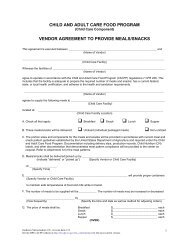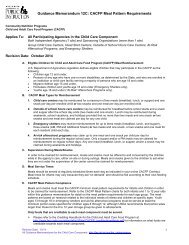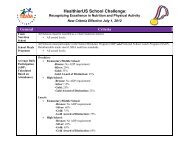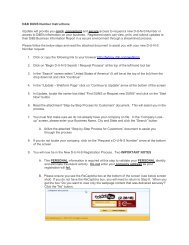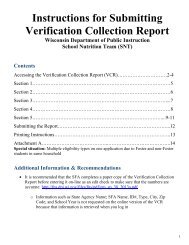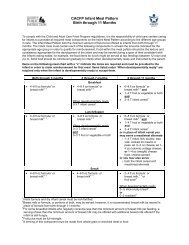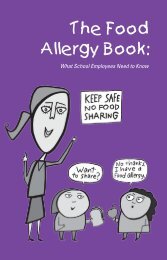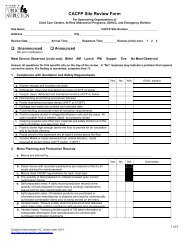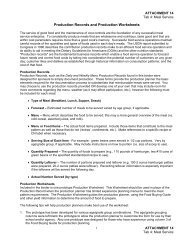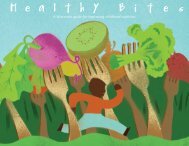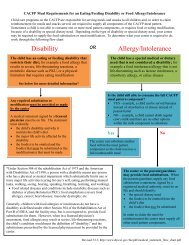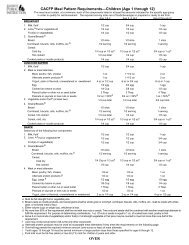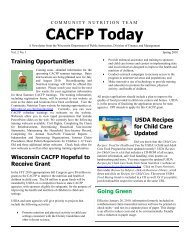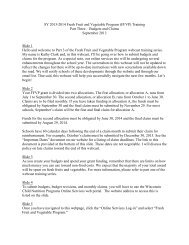nurse practitioner, or registered nurse) or other health professionalspecified by the State agency.Sponsors should be aware that meal or food substitutions for nondisabilitymedical or special dietary needs that are outside the mealpattern are not reimbursable.Food Allergies and IntolerancesA food allergy is a reaction of the body’s immune system to a proteinin a food called an allergen. Food allergies can be serious, lifethreateningconditions and should be diagnosed by a licensedphysician or board-certified allergist. Symptoms of a food allergicreaction may include a skin rash, hives, itchy, watery eyes, swellingof lips, tongue, and throat, itching in the mouth or throat, nausea,vomiting, diarrhea, difficulty breathing, or loss of consciousness.More than 170 foods are known to cause an allergic reaction in somepeople, but there are eight foods that most commonly trigger suchreactions: cow’s milk, eggs, peanuts, tree nuts, fish, shellfish, soy, andwheat. When food allergies may result in severe, life-threateningreactions, a physician may assess that the child meets the definition of“having a disability” and food service personnel must make thesubstitutions prescribed by a licensed physician.Food intolerance is an adverse food-induced reaction that does notinvolve the body's immune system. Lactose intolerance is oneexample of food intolerance. A person with lactose intolerance lacksan enzyme that is needed to digest milk sugar. When that person eatsmilk and milk products, gas, bloating, and abdominal pain may occur.Gluten intolerance, also known as Celiac disease, is another foodintolerance. Sponsors are not required to make food substitutions for aperson with food intolerances as food intolerances are not considereddisabilities. However, food substitutions may be made at a sponsor’sdiscretion for a child with a non-disability medical or special dietaryneed, such as a food intolerance. See Disabilities and Medical orSpecial Dietary Needs sections above for more information on mealand food substitutions.Dietary PreferencesSponsors are not required to make food substitutions based solely on aparent or child’s personal or taste preferences. The meal patterns aredesigned to be flexible and, with advance notice, may accommodateparents concern about religious food restrictions or preference fortheir child to eat vegetarian meals.18
Summer Menu PlanningIn this section you will find information on: How to plan your menus How to create a cycle menu How to calculate serving sizes and costs How to check your budget, inventory, labor, and equipmentGood menu planning for summertime involves several food serviceconsiderations. Most importantly, the menu should meet a child'snutritional needs. <strong>Child</strong>ren’s preferences, recipes, serving location, foodcosts, food safety and handling, equipment, and labor must also beconsidered.Planning menus means thinking about what foods to serve together tocreate a healthy meal with a variety of foods that complement each other,nutritionally and in flavor.A healthy diet: Emphasizes fruits, vegetables, whole grains, and fat-free or low-fatmilk products; Includes lean meats, poultry, fish, beans, eggs, and nuts; and Is low in saturated fats, trans fats, cholesterol, salt (sodium), and addedsugars.Key logistical considerations for menu planning include: the location,practicality, using cycle menus, calculating serving sizes and costs,delivering of the food, keeping food safe, and checking your budget,inventory, labor, and equipment. For example, if food is going to beserved outdoors or delivered to a playground or campsite, make the menupractical and appealing for this setting.Summer MenuPlanning:The BasicsUse the following steps to create a summer lunch menu:1. Begin with the main dish or entrée.Consider a source of protein from the meat or meat alternategroup. Sometimes, grains, vegetables, or fruits may also be part ofthe main dish, such as a taco, burrito, or chef’s salad.2. Choose a combination of a fruit and a vegetable that go welltogether and with the main dish.3. Include a whole-grain that is rich in fiber.4. Add low-fat or fat-free milk as the beverage.When menu planning, be sure to consider children’s likes and dislikes,design a meal that offers a variety of colors, textures, and tastes, andmeets the SFSP's meal pattern requirements. Very young children are at19
- Page 1 and 2: The Summer Food Service ProgramSumm
- Page 3 and 4: CONTENTSINTRODUCTION ..............
- Page 5 and 6: Using a Food Thermometer ..........
- Page 7: DietaryGuidelines forAmericansThe D
- Page 10 and 11: FOOD COMPONENTS AND FOOD ITEMSSUMME
- Page 12 and 13: Offer VersusServe (OVS)Offer versus
- Page 14: More on FoodComponentsThis section
- Page 17 and 18: For lunch and supper, 8 oz. or 1 cu
- Page 19: ProductFormulationSchool Foodservic
- Page 23 and 24: CalculatingServing Sizesand CostsCh
- Page 25 and 26: Sample Cycle MenusThe following is
- Page 27 and 28: Making the Most of Summer MealsBuil
- Page 29 and 30: fruits are naturally sweet, it can
- Page 31 and 32: Protect children’s hearts, brains
- Page 33 and 34: What type of grains should I offer?
- Page 35 and 36: Prepare a stir-fry with a variety o
- Page 37 and 38: SampleRecipesThe following recipes
- Page 39 and 40: 2 ¼ tsp Salt-free chili-lime seaso
- Page 41 and 42: Education and EnrichmentIn this sec
- Page 43 and 44: The Physical EnvironmentIf you are
- Page 45 and 46: PromotingPhysicalActivityWhile phys
- Page 47 and 48: Spotlight on Summer Food Service Pr
- Page 49 and 50: amounts of foods that will meet the
- Page 51 and 52: PART II — NUTRITION SERVICESHire
- Page 53 and 54: Getting Organized: Food Purchasing
- Page 55 and 56: DevelopingFoodSpecificationsWhen pr
- Page 57 and 58: How to Use theFood BuyingGuideUSDA'
- Page 59 and 60: Additional information about calcul
- Page 61 and 62: MenuProductionRecordsThe SFSP regul
- Page 63 and 64: ScoopsThe number of the scoop indic
- Page 65 and 66: Keep Food Fresh: Food StorageIn thi
- Page 67 and 68: Drive Dirt and Germs Out: Food Sani
- Page 69 and 70: Take Precautions: Food SafetyIn thi
- Page 71 and 72:
SEPARATESeparate foods that are rea
- Page 73 and 74:
For additional information, visitht
- Page 75 and 76:
Call the local or State Health Depa
- Page 77 and 78:
E. Coli ReportAccording to USDA's F
- Page 79 and 80:
Minimum Safe Internal Temperatures
- Page 81 and 82:
Approximate Storage Life in Days of
- Page 83 and 84:
e Will harden at high temperature,
- Page 85 and 86:
Frozen Food Storage (continued)The
- Page 87 and 88:
f Garlitz, Carol J., Boor, K., and
- Page 89 and 90:
Food Safety ChecklistDate__________
- Page 91 and 92:
Food Safety Checklist, continuedFOO
- Page 93 and 94:
Questions and Answers1. I have to h
- Page 95 and 96:
with food safety information, which
- Page 97 and 98:
MyPlateThe U.S. Department of Agric
- Page 99 and 100:
meal. Example: An orange and orange
- Page 101 and 102:
GROUP DMINIMUM SERVING SIZE FOR GRO
- Page 103 and 104:
How to Read Nutrition LabelsNutriti
- Page 105 and 106:
3. Limit these nutrientsIn general,
- Page 107 and 108:
Food Sources of Vitamin A (Continue
- Page 109 and 110:
Food Sources of Vitamin C (Continue
- Page 111 and 112:
Food Sources of Vitamin C (Continue
- Page 113 and 114:
Food Sources of Iron (Continued)Foo
- Page 115 and 116:
Food Sources of CalciumAll foods li
- Page 117 and 118:
Serving Sizes and Yields for Vegeta
- Page 119 and 120:
Serving Sizes and Yields for Fruits
- Page 121 and 122:
e of the Position:Sample Position D
- Page 123 and 124:
Food Service Equipment NeedsEquipme
- Page 125 and 126:
Quaternary ammonium compounds (Quat
- Page 127 and 128:
Sanitize Smallware in a Mechanical
- Page 129 and 130:
CAUTION:All equipment should be kep
- Page 131 and 132:
Food Inventory Record InstructionsT
- Page 133 and 134:
Date Marking Ready-to-Eat, Potentia
- Page 135 and 136:
DAILY TEMPERATURE FORM - INTERNAL F
- Page 137 and 138:
RESOURCE SECTIONInformation Resourc
- Page 139 and 140:
Nutrition.govNIFANCEMCHAdditional o
- Page 141 and 142:
Serving It Safe: A Manager’s Tool



